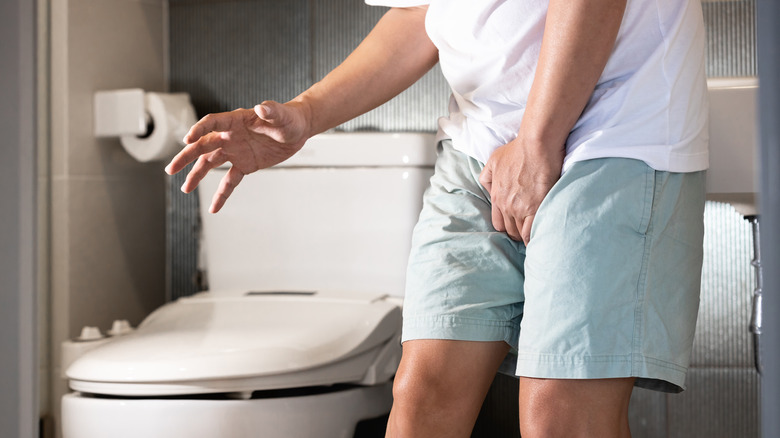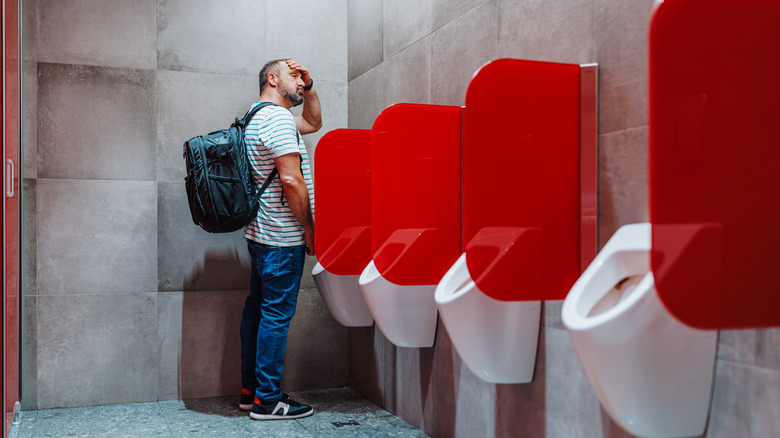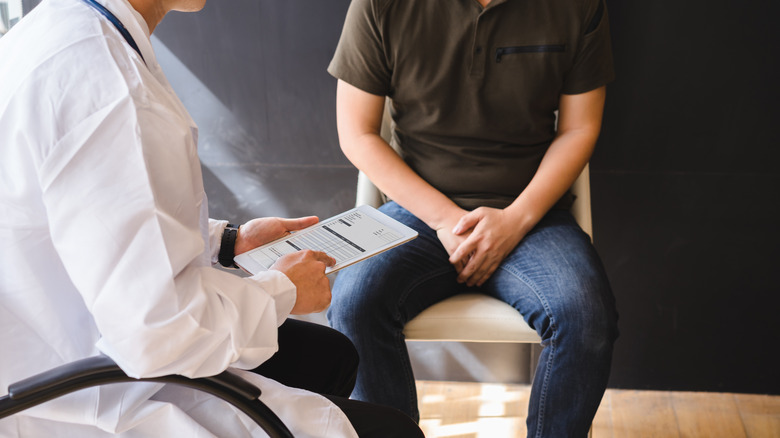What It Means When Men Can't Hold Their Pee
You might be prone to thinking that men not being able to hold in their pee, also referred to as "urinary incontinence" or "loss of bladder control," is related to old age, and this is partly right.
For example, being diagnosed with an enlarged prostate, which is a condition that happens with age and changes in testicular cells and hormones, might result in urinary urgency or the inability to hold urine in. A man's prostate is the walnut-sized gland that is located below the bladder and in front of the rectum and its main role is to keep sperm healthy and transport it via seminal fluid — getting it where it needs to go. Something else that's in close proximity to the prostate is the urethra, the tube that carries out urine from the bladder. An enlarged prostate (also referred to as "benign prostatic hyperplasia" or "BPH"), although not cancerous and not a risk factor for cancer, can place stress on the urethra and cause several symptoms related to urination, including being unable to hold in your pee, dribbling at the end of urination, having difficulty with peeing, being unable to fully empty your bladder, urinating frequently, feeling pain during urination, having bloody pee, or having a weak urine stream.
Prostate cancer, and corresponding treatments like radiation and surgery to remove your prostate, can also cause incontinence. In fact, not being able to hold in your pee is the primary side effect of prostatectomy, a surgery done to remove all or part of your prostate.
Other reasons men can't hold in their pee
As we said before, simply getting old can be reason enough for loss of bladder control. Your muscles, including the ones that make up your bladder, can weaken and lose their tone as you get older, leading to some pee slipping out every now and then.
Certain underlying diseases that damage your nerves and disrupt signaling between your bladder and brain can also lead to men not being able to hold in their pee — such as multiple sclerosis, Alzheimer's disease, stroke, diabetes, Parkinson's disease, brain tumor, or spinal injury. Obesity, lack of exercise, persistent coughing fits due to allergies or other illnesses, and even simpler things like urinary tract infections or constipation can cause someone to lose bladder control, too.
It is important to understand that certain medications like over-the-counter diuretics, cold medicines, antidepressants, sedatives, and opioids can also exacerbate issues of not being able to hold in your pee. So can drinking alcohol and caffeine; consuming spicy, sugary, or acidic food; and drinking carbonated beverages.
Coming back to prostate-related reasons for incontinence, while there are natural ways men can boost their prostate health as they age, like maintaining a healthy weight, eating a healthy diet, getting regular exercise, managing stress, and not smoking, sometimes, you may have to work together with your healthcare provider to find relief from the symptoms.
When to see a doctor about loss of bladder control
Although an enlarged prostate is not malignant, it can cause disruption to your quality of life. If all the symptoms we mentioned above have persisted for over two months and if you're also experiencing stomach or back pain and fevers, it is advisable that you see your doctor. Digital rectal exams, urine and blood tests, urine flow tests, and ultrasounds might be part of how the problem is diagnosed and thereafter, you might be put on medications and sometimes, also presented with the option of surgery. There is also laser therapy to destroy overgrown prostate tissue, water vapor thermal therapy which uses steam to remove excess prostate tissue, or embolization where the blood supply to and from the gland is blocked in order to shrink the size of the prostate.
Even with all the other causes of not being able to hold in your pee, if your symptoms are getting in the way of your everyday life, it's time to go and see a doctor. Frequently running to the bathroom, feeling like you're never able to fully empty your bladder, painful urination, and leaking when you cough, sneeze, laugh, or stand are pee symptoms men really shouldn't ignore.
With something more serious like prostate cancer and treatment, you might be prescribed pelvic floor exercises as treatment, along with lifestyle changes like drinking less caffeine and alcohol, avoiding spicy food, and drinking less water, taking medicines to increase bladder capacity, undergoing neuromuscular electrical stimulation to improve bladder control, having surgery, getting an artificial sphincter, or using penile clamps to prevent unnecessary leakage.



